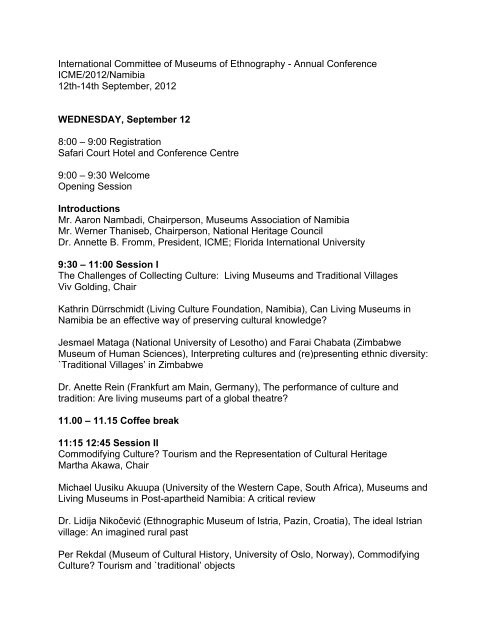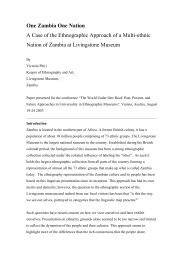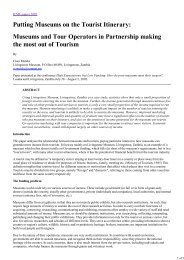International Committee of Museums of Ethnography - Annual - ICME
International Committee of Museums of Ethnography - Annual - ICME
International Committee of Museums of Ethnography - Annual - ICME
You also want an ePaper? Increase the reach of your titles
YUMPU automatically turns print PDFs into web optimized ePapers that Google loves.
<strong>International</strong> <strong>Committee</strong> <strong>of</strong> <strong>Museums</strong> <strong>of</strong> <strong>Ethnography</strong> - <strong>Annual</strong> Conference<br />
<strong>ICME</strong>/2012/Namibia<br />
12th-14th September, 2012<br />
WEDNESDAY, September 12<br />
8:00 – 9:00 Registration<br />
Safari Court Hotel and Conference Centre<br />
9:00 – 9:30 Welcome<br />
Opening Session<br />
Introductions<br />
Mr. Aaron Nambadi, Chairperson, <strong>Museums</strong> Association <strong>of</strong> Namibia<br />
Mr. Werner Thaniseb, Chairperson, National Heritage Council<br />
Dr. Annette B. Fromm, President, <strong>ICME</strong>; Florida <strong>International</strong> University<br />
9:30 – 11:00 Session I<br />
The Challenges <strong>of</strong> Collecting Culture: Living <strong>Museums</strong> and Traditional Villages<br />
Viv Golding, Chair<br />
Kathrin Dürrschmidt (Living Culture Foundation, Namibia), Can Living <strong>Museums</strong> in<br />
Namibia be an effective way <strong>of</strong> preserving cultural knowledge?<br />
Jesmael Mataga (National University <strong>of</strong> Lesotho) and Farai Chabata (Zimbabwe<br />
Museum <strong>of</strong> Human Sciences), Interpreting cultures and (re)presenting ethnic diversity:<br />
`Traditional Villages’ in Zimbabwe<br />
Dr. Anette Rein (Frankfurt am Main, Germany), The performance <strong>of</strong> culture and<br />
tradition: Are living museums part <strong>of</strong> a global theatre?<br />
11.00 – 11.15 C<strong>of</strong>fee break<br />
11:15 12:45 Session II<br />
Commodifying Culture? Tourism and the Representation <strong>of</strong> Cultural Heritage<br />
Martha Akawa, Chair<br />
Michael Uusiku Akuupa (University <strong>of</strong> the Western Cape, South Africa), <strong>Museums</strong> and<br />
Living <strong>Museums</strong> in Post-apartheid Namibia: A critical review<br />
Dr. Lidija Nikočević (Ethnographic Museum <strong>of</strong> Istria, Pazin, Croatia), The ideal Istrian<br />
village: An imagined rural past<br />
Per Rekdal (Museum <strong>of</strong> Cultural History, University <strong>of</strong> Oslo, Norway), Commodifying<br />
Culture? Tourism and `traditional’ objects
1:00 – 2:00 Lunch<br />
2:00 - Session III<br />
Festivals and the Performance <strong>of</strong> Culture<br />
Dr. Lydia Icke-Schwalbe, Chair<br />
Dr. Baerbel Kerkh<strong>of</strong>f-Hader (Pr<strong>of</strong>essor, University <strong>of</strong> Bamberg)<br />
Open Air <strong>Museums</strong> in Germany and the Performance <strong>of</strong> Culture<br />
Kunwook Lee (Curator, National Folk Museum <strong>of</strong> Korea), Experiments to Exhibit Things<br />
that are Intangible: A Study <strong>of</strong> Special Exhibitions; Arirang and Multiculture<br />
3:00<br />
Departure for Owela Display Centre <strong>of</strong> the National Museum <strong>of</strong> Namibia<br />
5:30<br />
Departure from Owela Display Centre to NICE Restaurant for Welcoming Reception<br />
THURSDAY, September 13<br />
8:30 – 10:00 Session VI<br />
<strong>Museums</strong> and the Safeguarding <strong>of</strong> Intangible Cultural Heritage<br />
Dr. Anette Rein, Chair<br />
Olefile Letsebe & Botho Modukanele (Botswana National Museum, Botswana), The<br />
Living Museum and Cultural Villages: Revival <strong>of</strong> Traditional Cultures in Botswana<br />
Kiwon Yi (National Folk Museum <strong>of</strong> Korea, Republic <strong>of</strong> Korea), Commodifying Culture<br />
through Intangible Heritage in the National Folk Museum <strong>of</strong> Korea<br />
Galia Gavish (retired curator, Israel), The Sheba Connection<br />
10:00 – 10:30 C<strong>of</strong>fee break<br />
10:30 – 12:15 Session V<br />
Speaking for Ourselves: Communities and Museum Exhibitions<br />
Per Rekdal, Chair<br />
Raffaella Fontanot (Museo Histórico y Etnográfico de Caborca, Mexico), The Jimtk<br />
Tohono Exhibition: An Experience in Participant Museology<br />
Kaingu Kalume Tinga (National <strong>Museums</strong> <strong>of</strong> Kenya), The Malindi Cultural Museum:<br />
Challenges for the 21st Century<br />
Heidi McKinnon (Curators Without Borders), Evolving Responsibilities: Social
Relevance and Expanding Museum Constituencies<br />
12:30 – 1:30 Lunch<br />
1:30 – 3:00 Session VI<br />
Constructing Culture? <strong>Museums</strong>, Cultural Villages and Identity<br />
Leif Pareli, Chair<br />
Sylvia Wackernagel (Museum <strong>of</strong> Anthropology, Leipzig, Germany), Culture as a<br />
commodity and beyond: Cultural exchange in `living’ museum settings with examples<br />
from the First Nations communities <strong>of</strong> Wendake/QC and Alert Bay/BC, Canada<br />
Silvia Forni (Royal Ontario Museum, Canada), A museum fit for a king: Art, heritage and<br />
politics in the Cameroonian Grasslands<br />
Fabienne Galangau-Quérat and Yves Girault (National Museum <strong>of</strong> Natural History,<br />
Paris, France), The museum’s experience in Cameroon as a media for tangible and<br />
intangible heritage<br />
3:30<br />
Departure for Tour <strong>of</strong> Heroes Acre<br />
8:00<br />
<strong>ICME</strong> Board Meeting<br />
Free evening for other participant<br />
FRIDAY, September 14<br />
8:30 – 10:15 Session VII<br />
Collections make Connections<br />
Dr. Lidija Nikočević, Chair<br />
Laurie Kalb Cosmo (Art History Faculty, Temple University, Rome, Italy), The History <strong>of</strong><br />
Exhibiting Africa in Italy<br />
Søren la Cour Jensen (House <strong>of</strong> Knud Rasmussen, Denmark), The Museum <strong>of</strong> Knud<br />
Rasmussen and the Inuit <strong>of</strong> the Artic<br />
Dr. Lydia Icke-Schwalbe (State Museum for <strong>Ethnography</strong>, Dresden, Germany), The<br />
changing concept <strong>of</strong> the museum: From colonial collections to the preservation <strong>of</strong><br />
cultural heritage<br />
Mario Buletic (Ethnographic Museum <strong>of</strong> Istria, Pazin, Croatia), Mediating culture in the<br />
frame <strong>of</strong> everyday life practices
10:15 – 10:30 C<strong>of</strong>fee break<br />
10:30 – 12:15 Session VIII<br />
Intangible Cultural Heritage and Museum Education<br />
Baerbel, Kerkh<strong>of</strong>f-Hader, Chair<br />
Viv Golding (School <strong>of</strong> Museum Studies, University <strong>of</strong> Leicester, UK), Museum Theatre<br />
and live interpretation in UK <strong>Museums</strong><br />
Abito Adebo Nelson (Department <strong>of</strong> <strong>Museums</strong> and Monuments, Kampala, Uganda),<br />
Post-conflict memorial preservation for reconciliation and the promotion <strong>of</strong> peace: The<br />
case <strong>of</strong> the Pabbo Internal People’s Displaced Camp Memorial<br />
Martin Tindi (National <strong>Museums</strong> <strong>of</strong> Kenya), Museum, Peacemaking and conflict<br />
Resolution<br />
Summary: <strong>ICME</strong> President<br />
12:30 – 1:30 Lunch<br />
2:00<br />
Departure for Township Tour<br />
6:00<br />
Departure for Closing Braai (Barbeque) at Xama Cultural Restaurant<br />
ICOM-<strong>ICME</strong> Post Conference Tour<br />
15th-18th September, 2012<br />
SATURDAY, September 15<br />
7:00 Bus departs Safari Court Hotel<br />
10:00 Arrive in Omaruru<br />
Omaruru is an important centre for the Herero people and has also acted as a trading<br />
centre for the areas cattle and game farming industries. In the last decade Omaruru has<br />
become something <strong>of</strong> a haven for those <strong>of</strong> an artistic nature (short walk or tour <strong>of</strong><br />
Omaruru).<br />
12:00 Lunch in Omaruru<br />
14:00 Bus departs Omaruru<br />
19:00 Arrive at Twyfelfontein Country Lodge.
SUNDAY, September 16<br />
8:00 Bus departs Twyfelfontein Country Lodge<br />
Guided Tour <strong>of</strong> Twyfelfontein or /Ui-//aes. Namibia’s only World Heritage Site (so far!)<br />
has one <strong>of</strong> the largest concentrations <strong>of</strong> petroglyphs (rock engravings) in Africa. Most <strong>of</strong><br />
these well-preserved engravings represent rhinoceros, six painted elephants, ostrich<br />
and giraffes, as well as drawings <strong>of</strong> human and animal footprints and rock shelters with<br />
motifs <strong>of</strong> human figures in red ochre. Objects excavated from two sections date from the<br />
Late Stone Age.<br />
11:00 Visit to the Damara Living Museum<br />
The Damara Living Museum was developed and built by Hansbernhard Naobes and<br />
opened in February 2010. It seeks to represent the traditional culture <strong>of</strong> one <strong>of</strong> the<br />
Khoekhoegowab speaking communities <strong>of</strong> Namibia.<br />
12:00 Bus departs for Khorixas<br />
13:30 Lunch break in Khorixas<br />
14.30 Bus departs for Etosha Safari Lodge<br />
18.00 Arrive at Etosha Safari Lodge<br />
MONDAY, September 17<br />
08:00 Morning game drive through Etosha<br />
Etosha National Game Park in Northern Namibia was declared a National Park in 1907.<br />
It <strong>of</strong>fers excellent game viewing in one <strong>of</strong> Africa’s most accessible venues. Zebra and<br />
springbok are scattered across the endless horizon, while the many waterholes attract<br />
endangered black rhinoceros, lion, elephant and large numbers <strong>of</strong> antelope. During the<br />
drier months from June to November the water points exert a magnetic pull on the big<br />
game herds.<br />
13:00 Lunch at Namutoni (Walk around for those who don’t want lunch)<br />
14:00 Bus departs Namutoni<br />
15:30 Bus arrives at Oshikoto Lake<br />
Otjikoto Lake is a national monument and a site with a lot <strong>of</strong> history, some mystery and<br />
ecological fascination below its surface.<br />
16.30 Bus departs for Tsumeb<br />
Tsumeb is the capital city <strong>of</strong> the Oshikoto region in northern Namibia. The Tsumeb<br />
Museum contains extensive displays about the history <strong>of</strong> the Tsumeb mine, Namibian<br />
stamps and the artillery <strong>of</strong> the German Schutztruppe that was retrieved from Lake
Oshikoto. It also has an ethnographic room which has some unique photographs and<br />
artefacts from the different ethnic groups in Namibia.<br />
17.00 Arrival at Kupferquelle Resort.<br />
19:00 Cultural Performance and Braai at the Helvi Mpingana Kondombolo Cultural<br />
Village<br />
The Helvi Mpingana Kondombolo Cultural Village is laid out in an outline <strong>of</strong> Namibia<br />
with traditional homesteads <strong>of</strong> the different ethnic communities <strong>of</strong> the country presented.<br />
It also contains a gallery with a permanent display <strong>of</strong> crafts and an extensive shop<br />
containing a variety <strong>of</strong> Namibian craft products.<br />
TUESDAY, September 18<br />
8.30 Bus departs Tsumeb for Cheetah Conservation Fund<br />
12:00 Arrival at Cheetah Conservation Fund<br />
13.30 Departure from Cheetah Conservation Fund<br />
16:30 Bus arrives in Okahandja, Visit Craft Market<br />
The site <strong>of</strong> an annual ceremony that takes place in August each year when Herero<br />
gather to visit the graves <strong>of</strong> their ancestral leaders. The town is also an important<br />
centre for woodcarvers from the north, who sell their carvings at the craft markets on a<br />
co-operative basis, next to the main road at both entrances to Okahandja.<br />
17:30 Bus departs for Windhoek<br />
18:30 Bus arrives in Windhoek<br />
Please remember – This program is subject to change, especially with regards to sites<br />
visited.




